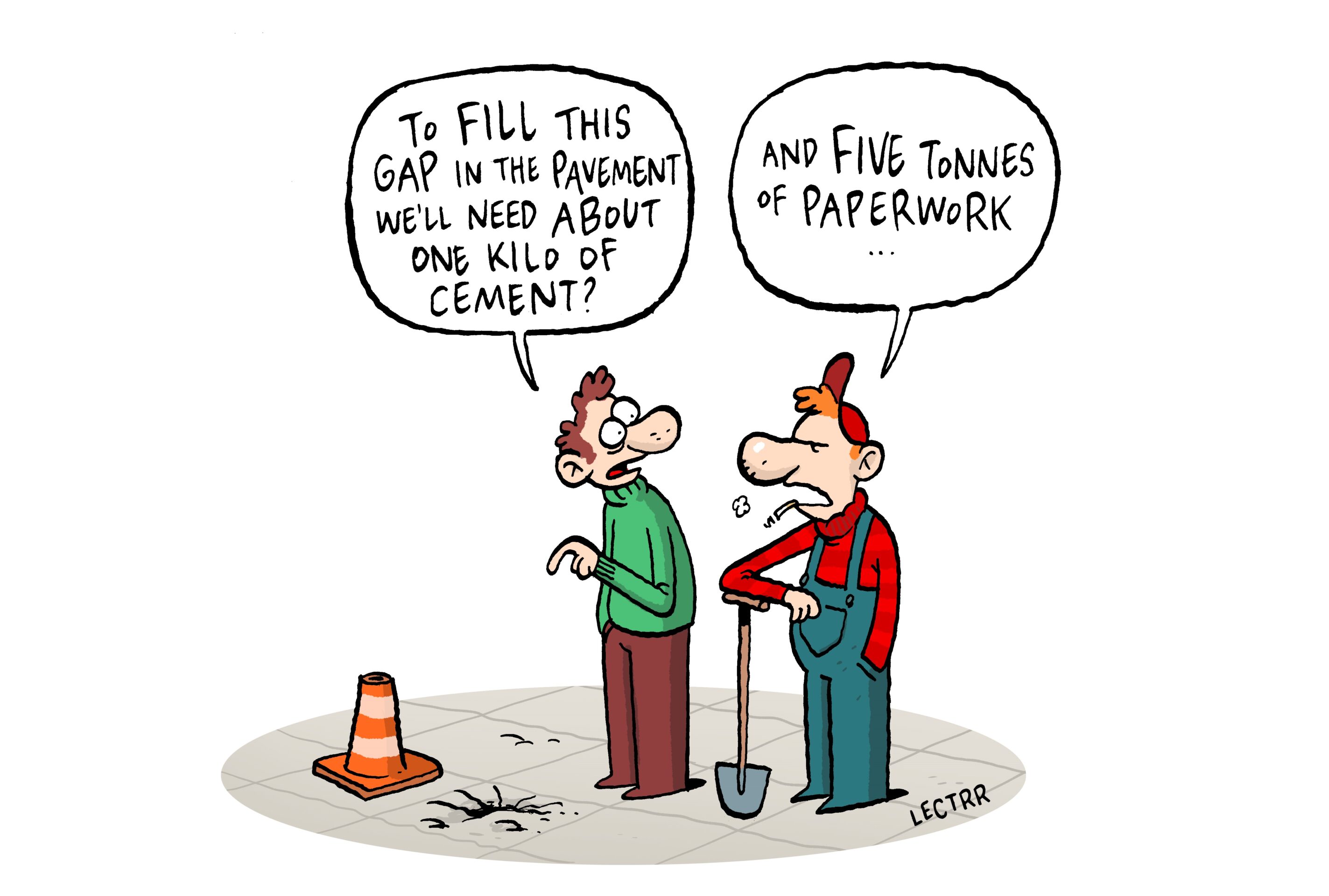For about half an hour recently I was convinced that I own a 10-storey block of flats overlooking a very pleasant park not far from the centre of Brussels.
Yes, you’re right, I should know whether or not I’m a property tycoon, but when the authorities insist that I am, and demand that I live up to my legal responsibilities, who am I to argue?
It says a lot about my respect for the powers and efficacy of our regulators, legislators and administrators that I should be so trusting, but I’ve learned over many years that, wherever you live, when bureaucracy comes calling, over-bearing though it may be, it usually has a point that must be confronted.
And that point, in the form of a summons, declaration, admonition, or final warning, is traditionally delivered to your door in a crisply-worded no-frills letter, often enclosed in a sludgy-brown envelope. The contents are almost guaranteed to discombobulate your day, diminish your bank account or demand days and weeks of domestic paperwork to track down some obscure document or proof of status, standing, solvency, guilt or innocence.
As I say, there is frequently a valid, if frustrating, point to these occasional bureaucratic interruptions to the smooth running of the average person’s daily life.
But not always.
We’ll return to my new recognition as an apartment block landlord in the Ville de Bruxelles in a moment, but first, come back with me about 15 years to the day when I received postal notification of a hefty parking fine.
It came from the parking department of the traffic cops division of the municipality of Lummen who had tracked me down via my car’s registration plate.
These things are sent to try us motorists so I merely tut-tutted at my own carelessness and put the demand for payment aside until the next time I was in the bank. (For younger readers this was in the good old days when most financial demands for payment were set out on a direct payment form which you signed and took to the bank - without needing an appointment! You could even exchange witty banter with a real live person while you drained your savings account. Happy days!)
But before I got to the stage of popping along to the bank, I realised that I had no idea where Lummen was. Even after I found it on a map, some 65km due east of Brussels, it didn’t help me recall ever being there.
Even so, at this point, such was my respect for authority (see above) that I was prepared to accept that I must somehow have passed through and actually parked in, Lummen. I decided that the easiest thing to do was to pay the fine and forget the whole thing: life’s too short.
What stopped me was my wife’s growing interest in why, if I might have been in Lummen without ever mentioning it to her, I had conveniently forgotten all about it.
If only to reassure her I grudgingly accepted that the authorities must be wrong. So I politely suggested that, on this rare occasion, notwithstanding my admiration for the work for law enforcement agencies, there was surely some bureaucratic error, because my car and I had never ever been anywhere near Lummen, lovely I am sure the place must be.
The warden’s scrawl
After a while, I received a reply insisting that the relevant department of the non-paid parking division had now cross-checked the registration plate of the Belgian-registered car against the traffic warden’s original, clearly-written, parking ticket: there had been no mistake and that payment was due.
For a moment it looked like game, set and match to the cops, but one thing was missing from their dossier of my infringement: it contained no details of the make of car which was attached to what was allegedly my number plate. So I wrote back seeking clarification before caving and paying up.
After a bit more delay the police reinforced their claim against me by “confirming” that the car was a beige Renault and re-confirming that the registration was mine.
I felt like Hercule Poirot at the point where he unmasks the murderer: my next letter to the Lummen parking squad declared triumphantly that my car was a silver Smart so it couldn’t be my car or my registration. I sent a copy of the Smart’s ownership and registration papers as proof.
It took more time, but finally someone wrote back confirming the cancellation of the fine. After a detailed inquiry into Lummengate, it was established that the parking ticket belonged to a Polish-registered Renault, the registration plate of which had been correctly and clearly logged by the traffic warden and happened to be the same as my car’s Belgian sequence of letters and numbers.
So who or what caused the confusion?
The letter explained that the traffic warden had also correctly but less clearly scribbled the Renault’s colour on the parking ticket as “Beige”, which was accidentally misread by someone in charge of pursuing parking fines as “Belge”. Hence the erroneous link to my identical registration, on a different kind of car in a different country.
You couldn’t make it up. However, now you probably think I’ve invented my elevation by regional government officials to the ranks of Brussels’ property bigwigs.
Magnate by mistake
So here are the facts. Towards the end of last year, I received an official-looking letter, which, although in a white envelope, had all the looks of something which would add a frisson to my day.
It concerned the state of the pavement outside a named apartment block not far from my home, and the wording, in French, was direct.
The letter declared that, following an “on-site inquiry” at the address of an apartment block (which is a 15-minute walk from my own address), “it appears that the pavement is showing some damage that could present a CLEAR DANGER TO PEDESTRIANS (broken sidewalk slabs)”. The capitals denote bits written in bold type.

The pavement in question
The letter also told me that Article 2 of the rules on pavements in Brussels states that the reconstruction and complete restoration of such damage is the responsibility of the “PROPRIETAIRE RIVERAIN.”
It advised: “It would be wise for you to carry out repairs as quickly as possible. YOUR RESPONSIBILITY IN THE EVENT OF AN ACCIDENT CAN BE ENGAGED”.
I was invited to name an authorised pavement repair company to do the work in conformity with a decree of May 3, 1918, relating to road construction sites and the required implementation orders.
It was all a shock. I never knew that I owned the building, but I am familiar with it: I have a garage space in its basement, alongside 30 or 40 other car owners, most of whom are also apartment owners in the block. Maybe all of them had received the same letter?
I trotted down the road to check the offending trottoir, take a photo of the damage, and show the building’s concierge the letter. No, she said, and she was certain that the problem had not been raised with the ‘Syndic’, or managing agent, which turned out to be correct.
She also confirmed my suspicion that I am not actually the owner of the building – a mixture of relief but also disappointment.
I returned to my real, much smaller home, wondering why the owner of a house, or apartment block, would be asked to repair a bit of public pavement. Having said that, the scale of this particular wobbly paving stone crisis was so small that I would happily have paid for the repairs if the Ville de Bruxelles somehow conferred ownership of the whole thing to me.
More immediately, I had to respond to this bureaucratic demand, which a part of me still reckoned had to be to some degree justified by some evidence of my culpability.
Salutations and salvation
For a couple of days, I considered the options and implications of the whole saga. I even had a bit of a sleepless night about it. The letter contained in the small print the name of someone to call, the phone number and an e-mail address. Finally, when I called, an answering machine told me it was not possible to speak directly to anybody.
So I sent a simple, neutral message pointing out that I didn’t own or live in the relevant apartment block and invited the chap to get in touch for further clarification. I ended with “Salutations”.

Lummen in Flanders is certainly picturesque
I sat back imagining the next few weeks of exchanges with officials, interviews, and endless steps which would have to be taken to find documents and other stuff to demonstrate that they were targeting the wrong chap.
I sent my message at 09.54 last November 16. I received a reply the same day at 13.33. It said: “Hello Sir. It’s ok, the owner of the building will take action. I’m sorry for this mistake. Salutations”
One day I would like to take him out to lunch for restoring my slightly shaken faith in officialdom. I might even learn how my name came into the picture at all. And I might even find out why such a very minor repair, or any pavement restoration at all is laid at the door of the “propriétaire riverain”.
Meanwhile, some two months later, the offending bit of pavement, which I’m checking regularly, is still not fixed.
Maybe one of these nights when all is quiet, I’ll nip down there myself with a couple of paving stones and some quick-drying cement and do it myself after all.

